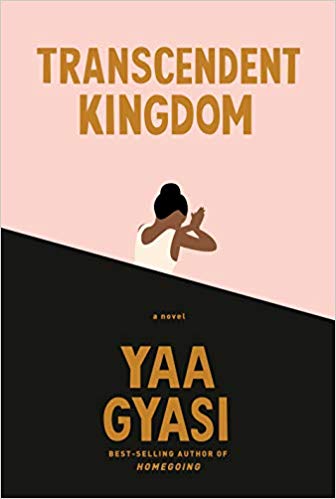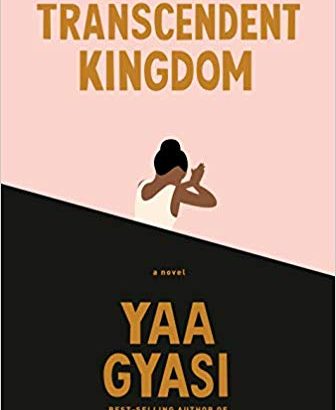Yaa Gyasi’s Transcendent Kingdom Review By: Paloma Lenz

 In Yaa Gyasi’s second novel, Transcendent Kingdom, we first meet Gifty when she is 28 years old and a Ph.D. candidate in neuroscience at the Stanford University School of Medicine. She is studying reward-seeking behavior in mice and the neural circuits of depression and addiction. She admits to choosing neuroscience because she thought it would be the hardest thing to excel at. Having grown up in the American south and as the child of Ghanian immigrants, Gifty knew “I would always have something to prove and that nothing but blazing brilliance would be enough to prove it.”
In Yaa Gyasi’s second novel, Transcendent Kingdom, we first meet Gifty when she is 28 years old and a Ph.D. candidate in neuroscience at the Stanford University School of Medicine. She is studying reward-seeking behavior in mice and the neural circuits of depression and addiction. She admits to choosing neuroscience because she thought it would be the hardest thing to excel at. Having grown up in the American south and as the child of Ghanian immigrants, Gifty knew “I would always have something to prove and that nothing but blazing brilliance would be enough to prove it.”
In the midst of her experiments and solitary life, her mother arrives at her apartment. She lies down in Gifty’s bed and doesn’t rise for weeks. This is not the first time her mother has been hit by an intense and overwhelming wave of depression, so Gifty watches her day after day, hoping for a shift in her position, a sip of water, or a smile. The first time this happened, Gifty’s older brother Nana had just died.
Gifty and Nana grew up with their mother in Huntsville, Alabama. Their mother, who remains unnamed throughout the novel, moved with Nana from Ghana before being joined by their father. Gifty was born soon after. Unable to cope with the deeply-rooted racism of the American south, Gifty’s father returned to Ghana and though the children briefly maintained a relationship with him by phone, that didn’t last long. Soon, he starts a second family in Ghana and disappears from their life.
In his absence, Nana and Gifty are left to navigate the troubled waters of American racism as their mother works to provide a steady life for them. They attend an all-white, evangelical Christian church as the only black family in the congregation. Gifty is as devoted as her mother, keeping a journal in which she writes to God throughout her childhood. As Nana finds his rhythm in sports, Gifty is his main support system, attending all his basketball games and walking home with him afterward. Their relationship is intimate without being overly loving. They are there for one another every step of the way. Until Nana injures his ankle during a game and receives a prescription for OxyContin.
From this point, Nana finds an escape from the high he gets from his prescription opioids. He loses interest in everything else, even basketball which he was so focused on, practicing and studying it almost every single day. After he receives the prescription, he hardly moves from the couch. Gifty often sees his head rolling back and his eyes shut. When their mother finally figures out what’s going on she takes the pills away, but Nana finds new ways to obtain pills. Gifty records the events in her journal entries to God, pleading for Nana to be saved.
As Nana spirals downward, Gifty’s religious beliefs shift. She begins to see the contradictions of her church more clearly. When he was the star basketball player, Pastor John would bring Nana on stage at church and ask everyone in attendance to pray for him. But once he was injured and fell into drug addiction, the congregation abandoned him. She overhears two women voice their apathy out loud, saying, “their kind does seem to have a taste for drugs.” Later, an adult Gifty gives voice to their experience as the only black family in their neighborhood. “When I was a child, no one ever said the words ‘institutionalized racism.’ We hardly even said the word ‘racism.’” She goes on to explain that she had no words to explain the “little throbbing stone of self-hate that I carried around with me to church, to school…” The veil of her religious beliefs is raised and she can never believe so willfully ever again.
Much like the experience of Dr. Martin Luther King, Jr. who at the outset of his work fighting racial injustice in the 1960s expected to call the white churches of the south allies to the movement but instead witnessed many of these same churches “stand on the sideline and mouth pious irrelevancies and sanctimonious trivialities,” Gifty discovers that her white church’s benevolence had limits when it came to race. Her mother’s intentions were good in hoping the God of the white church was the same one of her Ghanian faith. Gifty discovers this to be untrue. It is a spiritual wound that she carries with her into adulthood.
The family’s story is gripping. The book is not wrought with action, but of slow and heavy experiences that weigh on the psyche of its characters, and that of the reader too. It is a study of grief and loss and its effects in different forms, using one family enduring the intersection of race, mental health, and religious faith – a major achievement by Gyasi.



